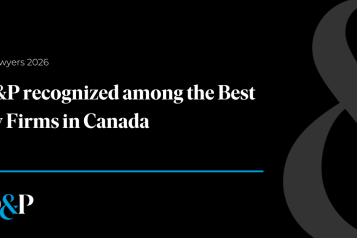Publication
Best practices for employers accommodating transgender workers
Published June 17, 2019
All facets of employment – from recruiting and hiring to termination can be potential points for employers to discriminate against transgender individuals through discriminatory biases or practices. The possible stigma associated with changing gender identity raises the concern for harassment and bullying in the workplace. What can employers to do ensure their workplace supports transgender workers while complying with legal obligations? This article will canvass some of the legal responsibilities and provide tips for employers to support transgender individuals in the workplace.
Employer obligations
The Alberta Human Rights Act (the Act), as with the human rights legislation federally and in all Canadian provinces, prohibits discrimination in the employment context on the basis of gender identity and gender expression. Specifically, section 7 of the Act states:
7 (1) No employer shall
- refuse to employ or refuse to continue to employ any person, or
- discriminate against any person with regard to employment or any term or condition of employment, because of the .gender identity, gender expression .of that person or of any other person.
An Alberta Human Rights Commission publication describes gender identity and gender expression as follows:
Gender identity: Refers to a person's internal, individual experience of gender, which may not coincide with the sex assigned to them at birth. A person may have a sense of being a woman, a man, both, or neither. Gender identity is not the same as sexual orientation, which is also protected under the Act.
Gender expression: Refers to the varied ways in which a person expresses their gender, which can include a combination of dress, demeanour, social behaviour and other factors.
Workplace considerations related to gender identity and gender expression are often associated with transgender workers. Transgender is an umbrella term for people whose gender identity and/or gender expression differs from what is typically associated with the sex they were assigned at birth. Transgender people can identify themselves using one or more of a number of terms, including transgender, transsexual, or cross-dresser.
Employer's duty to accommodate
What are employer responsibilities regarding employees that are transgender? Employers in Alberta have a duty to accommodate employees with respect to grounds protected by the Act to the point of undue hardship. Accommodation in this context means making changes to certain rules, standards, policies, workplace cultures and physical environments to ensure that they do not negatively affect a person because of any protected ground, including gender identity and gender expression. Thus, the duty to accommodate legally requires employers to meet the needs of transgender workers.
There are a number of workplace accommodations that employers may be required to implement for transgender workers, including:
- Names and pronouns: Employers should consistently use employees' identified name(s) and pronoun(s) in ways requested by the employee. This may require that organization charts, phone directories, mailing lists, schedules and identification cards, for example, need to be updated.
- Dress code and uniforms: Transgender employees should be permitted to dress in a manner consistent with their gender identity. If an employer has uniforms that are gender-specific, employees should have the flexibility to choose which uniform to wear.
- Washrooms and changing facilities: All employees should have access to washrooms or change facilities according to their lived gender identity. Based on the circumstances, employers may have to consider creating additional facilities including single-occupancy, gender neutral facilities.
- Benefits and medical coverage: Transgender employees should not be denied group benefits on the basis of gender identity or expression.
- Leaves: Time off for medical appointments and procedures relating to an employee's transition should be granted on the same basis as any other scheduled medical leave or procedure.
Privacy considerations
In addition to rights under human rights legislation, transgender employees also have certain rights with respect to privacy and confidentiality. Privacy legislation in Alberta deals with the collection, retention, use and disclosure of personal information. Employers should ensure that there is no unlawful or unnecessary collection, use or disclosure of an employee's personal information, including gender identity and medical information.
Public bodies and private sector organizations are subject to different privacy legislation.
Public bodies such as the provincial government and its agencies, boards and commissions, local government bodies, school jurisdictions, post-secondary institutions, health care bodies, and public services and commissions are subject to the Alberta Freedom of Information and Protection of Privacy Act (the FOIP Act).
Private sector privacy legislation applicable in Alberta includes the Alberta Personal Information Protection Act (PIPA) and the federal Personal Information Protection and Electronic Documents Act (PIPEDA). PIPEDA applies to federally regulated private sector organizations in addition to provincially-regulated businesses in provinces without substantially similar provincial private sector privacy legislation such as Alberta's PIPA.
Both the public and private sector privacy legislation provide employers with a framework for conducting the collection, use or disclosure of personal information and generally require an employer to obtain consent when they collect, use or disclose and employee's personal information.
Workplace harassment
Another consideration for employers with respect to transgender employees is an employer's duty to protect its workers against workplace harassment and violence. The recent changes to the Alberta Occupational Health and Safety Act prohibit workplace harassment and violence.
Harassment based on gender identity and expression can take many forms in the workplace, including inappropriate comments or questioning, teasing, isolation, bullying, and other forms of verbal abuse. Workplace harassment is a very real concern for transgender employees and as such, employers should ensure that their workplace harassment policy specifically includes gender identity and gender expression as prohibited grounds of harassment.
Case law example
The Human Rights Tribunal of Ontario decision in Vanderputten v Seydaco Packaging Corp may act as a lesson to employers on the penalties of failing to accommodate transgender workers. In that case, during the time that the applicant, Maria Vanderputten (“V”), worked for Seydaco, a paper product factory, she transitioned from living as a man to living as a woman, started the process of sex reassignment, and developed female breasts.
V filed a human rights complaint against her former employer and former colleague, alleging that she experienced workplace harassment, was subjected to a poisoned work environment, and was dismissed in violation of the Ontario Human Rights Code. The individual respondent, Gerry Sanvido, is alleged to have played a critical role in V's harassment and the incident that led to her dismissal. The respondents denied the allegations, and argued that V was treated appropriately and dismissed solely for her attitude, involvement in workplace conflicts, and insubordination.
V produced evidence of several incidents and issues that arose in the workplace, including:
- Seydaco required V to continue to use the men's washroom until she could prove she was female;
- V's request to change her shift times to avoid changing with men because she was subjected to harassing behaviours while changing was denied; and
- V was regularly subjected to name calling such as "faggot," "fruitcake," and "fag" because of being transgender.
V was ultimately terminated from her employer following an altercation with a co-worker during which she allegedly threw a skid (a shipping pallet) at him. She alleged that the co-worker had called her an "asshole" and a "faggot".
The adjudicator concluded that V had been subjected to a poisoned work environment through name-calling, harassing comments about her gender identity, derogatory postings on bulletin boards, and being required to use the men's change room. Seydaco was specifically criticized for:
- insisting that V be treated in the same manner as men until her transition was complete, which exposed V to further harassment and failed to take into account her needs and identity;
- failing to consider, explore or implement any solutions that would have allowed V privacy while changing; and
- failing to investigate and respond to V's allegations of workplace harassment.
The adjudicator awarded V general damages in the amount of $22,000 for injury to her dignity, feelings and self-respect. Of that award, her former colleague was required to pay a small portion. The general damages award took into account V's aggressive, inappropriate and insubordinate behaviour in the workplace, which sometimes played a role in the incidents, and as such the damages award was somewhat lower than it otherwise would have been. The adjudicator also awarded V eight months' lost wages, and ordered Seydaco to develop formal policies, and required human rights training for their managers.
Takeaways
Employer obligations with respect to transgender workers include that employers:
- are not permitted to discriminate on the basis of gender identity or expression in hiring, training or promoting transgender workers;
- cannot fire transgender employees because they transition or indicate to others that they are transgender;
- must give transgender workers access to appropriate washrooms, uniforms, dress code, etc. during and after transition;
- uphold privacy, confidentiality and dignity of the worker;
- cooperate and change records for pension coverage, medical and health plans, EI, CPP, etc. to reflect a transgender worker's new gender identity;
- provide access to private health care benefits to transgender workers that are available to other members with other medical needs (i.e. wigs);
- have the primary legal responsibility to accommodate a worker to the point of undue hardship; and
- should ensure their policies and practices reflect transgender workers' right to be free from discrimination and harassment while at work.
This bulletin is intended as general information only and is not to be taken as legal advice. If you have any questions please contact any member of our Employment Group.


